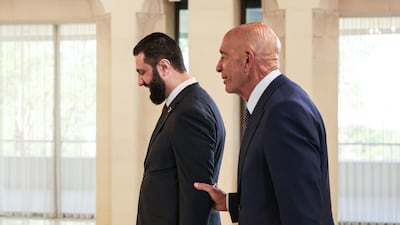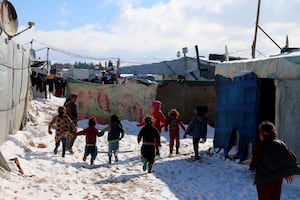President Ahmad Al Shara and a Syrian Kurdish militia leader failed to meet as expected on Wednesday during a visit to Damascus by US special envoy Thomas Barrack, sources said.
It was a setback to US-sponsored moves to resolve the biggest obstacle to reuniting Syria after its 13-year civil war.
The sources did not reveal why the meeting in Damascus did not go ahead between Mr Al Shara and Mazloum Abdi, the head of the US-backed Syrian Democratic Forces militia that controls large parts of eastern Syria.
The two were expected to discuss ways to bring the SDF under the control of the Syrian army command. “We are more far away from a grand bargain,” an SDF official told The National.
Mr Barrack held a meeting with Mr Al Shara, state media said, without revealing details of their discussions.
The SDF official said Mr Abdi had gone to Damascus confident that there would be no “sidelining of the SDF”.
The official said the SDF has been buoyed by the Pentagon's allocation of $130 million for groups in Syria with which it has linked up in counter-ISIS operations, mainly the SDF, in its 2026 budget.
Mr Barrack told AP after meetings in Damascus that significant differences remain between the two sides. He also told Rudaw Media Network that the SDF has been "slow" in negotiating with the Syrian government and that federalism "doesn't work."
“I think SDF has been slow in accepting and negotiating and moving towards that, and my advice to them is to speed that,” Mr Barrack said. “There is only one road and that road is to Damascus.”
US backing for the SDF has prevented Mr Al Shara from consolidating his control over the country since the removal of his predecessor Bashar Al Assad in December.
The March 10 agreement between Mr Al Shara and Mr Abdi faltered after the SDF convened a conference of Kurdish political groups in April that demanded that Syria be governed under a federal system.
“It is neither in the interest of Al Shara or any of the international players for the SDF to weaken, because it would mean the resurgence of ISIS,” the official said.
He said Mr Barrack had proposed that the SDF becomes formally part of the Syrian armed forces but retains its Kurdish commanders, a “symbolic” arrangement akin to Syrian armed groups that are proxies of Turkey joining the army in February. Many of these units retained their command structure and their Turkmen commanders.
However, the SDF's position as Washington's main ally in Syria has been undermined after US began normalising ties with its new government in May, and putting more focus on stabilising the country.
The US lifted sanctions on Syria last month and on Monday revoked the terror designation of the hardline Hayat Tahrir Al Sham rebel group, a former affiliate of Al Qaeda, to which Mr Al Shara and many members of the new government belonged.
Turkey, a major backer of Mr Al Shara's government, considers the SDF a separatist group that threatens its national security, because of its ties with the Kurdistan Workers' Party (PKK) which waged a 40-year insurgency against the Turkish state.
Turkey is involved in a process to disarm and dissolve the PKK.
Omer Ozkizilcik, a non-resident fellow at the Atlantic Council, said the US was using its sway to urge the SDF to accept integration into Damascus-controlled armed forces.
“The March 10 agreement was not proceeding due to stalling by the SDF,” he told The National. “It appears that the US is using its influence to move things forward and force the SDF to accommodate the demands of Damascus."
Both Damascus and Ankara, which has significant influence over the new Syrian authorities, had given the SDF "olive branches," including some form of local governance, he added.
“But they thought they are in a position to dictate terms.”
Indoor Cricket World Cup - Sept 16-20, Insportz, Dubai
57%20Seconds
%3Cp%3E%3Cstrong%3EDirector%3A%3C%2Fstrong%3E%20Rusty%20Cundieff%0D%3Cbr%3E%3Cstrong%3EStars%3A%20%3C%2Fstrong%3EJosh%20Hutcherson%2C%20Morgan%20Freeman%2C%20Greg%20Germann%2C%20Lovie%20Simone%0D%3Cbr%3E%3Cstrong%3ERating%3A%20%3C%2Fstrong%3E2%2F5%0D%3Cbr%3E%0D%3Cbr%3E%3C%2Fp%3E%0A
if you go
The flights
Flydubai flies to Podgorica or nearby Tivat via Sarajevo from Dh2,155 return including taxes. Turkish Airlines flies from Abu Dhabi and Dubai to Podgorica via Istanbul; alternatively, fly with Flydubai from Dubai to Belgrade and take a short flight with Montenegro Air to Podgorica. Etihad flies from Abu Dhabi to Podgorica via Belgrade. Flights cost from about Dh3,000 return including taxes. There are buses from Podgorica to Plav.
The tour
While you can apply for a permit for the route yourself, it’s best to travel with an agency that will arrange it for you. These include Zbulo in Albania (www.zbulo.org) or Zalaz in Montenegro (www.zalaz.me).
Why seagrass matters
- Carbon sink: Seagrass sequesters carbon up to 35X faster than tropical rainforests
- Marine nursery: Crucial habitat for juvenile fish, crustations, and invertebrates
- Biodiversity: Support species like sea turtles, dugongs, and seabirds
- Coastal protection: Reduce erosion and improve water quality
UAE%20SQUAD
%3Cp%3E%0D%3Cstrong%3EMen%3A%3C%2Fstrong%3E%20Saif%20Al%20Zaabi%2C%20Salem%20Al%20Marzooqi%2C%20Zayed%20Al%20Ansaari%2C%20Saud%20Abdulaziz%20Rahmatalla%2C%20Adel%20Shanbih%2C%20Ahmed%20Khamis%20Al%20Blooshi%2C%20Abdalla%20Al%20Naqbi%2C%20Khaled%20Al%20Hammadi%2C%20Mohammed%20Khamis%20Khalaf%2C%20Mohammad%20Fahad%2C%20Abdulla%20Al%20Arimi.%0D%3Cbr%3E%3Cstrong%3EWomen%3A%3C%2Fstrong%3E%20Mozah%20Al%20Zeyoudi%2C%20Haifa%20Al%20Naqbi%2C%20Ayesha%20Al%20Mutaiwei.%3C%2Fp%3E%0A
Read more from Aya Iskandarani
Company%20profile
%3Cp%3E%3Cstrong%3EName%3A%20%3C%2Fstrong%3EPurpl%3C%2Fp%3E%0A%3Cp%3E%3Cstrong%3ECo-founders%3A%20%3C%2Fstrong%3EKarl%20Naim%2C%20Wissam%20Ghorra%2C%20Jean-Marie%20Khoueir%3C%2Fp%3E%0A%3Cp%3E%3Cstrong%3EBased%3A%20%3C%2Fstrong%3EHub71%20in%20Abu%20Dhabi%20and%20Beirut%3C%2Fp%3E%0A%3Cp%3E%3Cstrong%3EStarted%3A%20%3C%2Fstrong%3E2021%3C%2Fp%3E%0A%3Cp%3E%3Cstrong%3ENumber%20of%20employees%3A%20%3C%2Fstrong%3E12%3C%2Fp%3E%0A%3Cp%3E%3Cstrong%3ESector%3A%20%3C%2Fstrong%3EFinTech%3C%2Fp%3E%0A%3Cp%3E%3Cstrong%3EFunding%3A%20%3C%2Fstrong%3E%242%20million%26nbsp%3B%3C%2Fp%3E%0A
COMPANY%20PROFILE
%3Cp%3E%3Cstrong%3EName%3A%20%3C%2Fstrong%3EElmawkaa%3Cbr%3E%3Cstrong%3EBased%3A%3C%2Fstrong%3E%20Hub71%2C%20Abu%20Dhabi%3Cbr%3E%3Cstrong%3EFounders%3A%3C%2Fstrong%3E%20Ebrahem%20Anwar%2C%20Mahmoud%20Habib%20and%20Mohamed%20Thabet%3Cbr%3E%3Cstrong%3ESector%3A%3C%2Fstrong%3E%20PropTech%3Cbr%3E%3Cstrong%3ETotal%20funding%3A%3C%2Fstrong%3E%20%24400%2C000%3Cbr%3E%3Cstrong%3EInvestors%3A%20%3C%2Fstrong%3E500%20Startups%2C%20Flat6Labs%20and%20angel%20investors%3Cbr%3E%3Cstrong%3ENumber%20of%20employees%3A%3C%2Fstrong%3E%2012%3Cbr%3E%3C%2Fp%3E%0A
The National Archives, Abu Dhabi
Founded over 50 years ago, the National Archives collects valuable historical material relating to the UAE, and is the oldest and richest archive relating to the Arabian Gulf.
Much of the material can be viewed on line at the Arabian Gulf Digital Archive - https://www.agda.ae/en
INDIA SQUAD
Virat Kohli (capt), Rohit Sharma, Shikhar Dhawan, KL Rahul, Vijay Shankar, MS Dhoni (wk), Kedar Jadhav, Dinesh Karthik, Yuzvendra Chahal, Kuldeep Yadav, Bhuvneshwar Kumar, Jasprit Bumrah, Hardik Pandya, Ravindra Jadeja, Mohammed Shami
UAE currency: the story behind the money in your pockets
'Panga'
Directed by Ashwiny Iyer Tiwari
Starring Kangana Ranaut, Richa Chadha, Jassie Gill, Yagya Bhasin, Neena Gupta
Rating: 3.5/5
PROFILE OF SWVL
Started: April 2017
Founders: Mostafa Kandil, Ahmed Sabbah and Mahmoud Nouh
Based: Cairo, Egypt
Sector: transport
Size: 450 employees
Investment: approximately $80 million
Investors include: Dubai’s Beco Capital, US’s Endeavor Catalyst, China’s MSA, Egypt’s Sawari Ventures, Sweden’s Vostok New Ventures, Property Finder CEO Michael Lahyani
Global state-owned investor ranking by size
|
1.
|
United States
|
|
2.
|
China
|
|
3.
|
UAE
|
|
4.
|
Japan
|
|
5
|
Norway
|
|
6.
|
Canada
|
|
7.
|
Singapore
|
|
8.
|
Australia
|
|
9.
|
Saudi Arabia
|
|
10.
|
South Korea
|
Timeline
2012-2015
The company offers payments/bribes to win key contracts in the Middle East
May 2017
The UK SFO officially opens investigation into Petrofac’s use of agents, corruption, and potential bribery to secure contracts
September 2021
Petrofac pleads guilty to seven counts of failing to prevent bribery under the UK Bribery Act
October 2021
Court fines Petrofac £77 million for bribery. Former executive receives a two-year suspended sentence
December 2024
Petrofac enters into comprehensive restructuring to strengthen the financial position of the group
May 2025
The High Court of England and Wales approves the company’s restructuring plan
July 2025
The Court of Appeal issues a judgment challenging parts of the restructuring plan
August 2025
Petrofac issues a business update to execute the restructuring and confirms it will appeal the Court of Appeal decision
October 2025
Petrofac loses a major TenneT offshore wind contract worth €13 billion. Holding company files for administration in the UK. Petrofac delisted from the London Stock Exchange
November 2025
180 Petrofac employees laid off in the UAE
Groom and Two Brides
Director: Elie Semaan
Starring: Abdullah Boushehri, Laila Abdallah, Lulwa Almulla
Rating: 3/5


